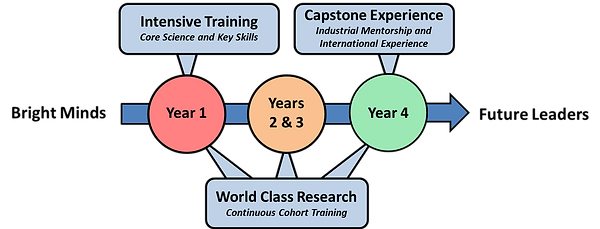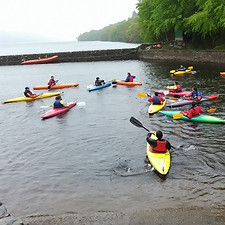
Welcome to the CRITICAT CDT
The EPSRC Centre for Doctoral Training in Critical Resource Catalysis (CRITICAT) is a PhD training programme hosted by St Andrews, Heriot-Watt and Edinburgh Universities. CRITICAT offers a four-year PhD in catalysis and provides comprehensive training in homogeneous-, heterogeneous- and bio-catalysis as well as reaction engineering.
CRITICAT research projects focus on catalysis and how it can be used to limit society's reliance on non-sustainable feedstocks. This is achieved by developing new catalytic methods or improving existing processes to make the best use of our available resources. CRITICAT will train 75 PhD students by 2022 and produce the next generation of leading scientists in this important field.

Technical Training Rotations
Students enrolled on the CRITICAT programme begin their PhDs with an intensive six-month training period (full-time at St Andrews). The training period is divided into a four-month taught course and a two-month “mini-project”.

Our Advanced Workshop at Firbush includes a combination of science and team-building activities. Students deliver oral presentations that introduce their research projects in a broad context as well as present posters on their most recent findings. This is complimented with group activities such as kayaking and mountain biking designed to increase bonding between cohorts.
"Our team included people from varied backgrounds, but by the end of the ten weeks we had bonded really well"

-- Ivalina Minova
Intensive Training
Mini-Projects
Following completion of the taught course, students take part in a 10-week team research project. These are conducted in small groups (2-3 students) and are typically interdisciplinary in nature. The mini-project culminates with a group presentation at the CRITICAT Catalysis Conference in which students present their results to staff, industrial collaborators and peers.
CRITICAT students take part in three technical training rotations (TTRs) over the course of the taught program. The rotations showcase catalysis research from different disciplines and provide training in core techniques including:
Lectures and Workshops
CRITICAT lectures cover all aspects of homogenous-, heterogeneous- and bio-catalysis as well as chemical engineering. The lectures are delivered from leading-experts in their respective fields from each of the three Universities. Additional Skills Training sessions introduce CRITICAT students to scientific publishing, presentations skills and research software.
PhD Study and Advanced Workshops
Capstone Experience
Over the course of their PhD, each CRITICAT student will have an opportunity to carry out an external research placement either at an academic institution or collaborating industrial partner. CRITICAT have strong links with several industrial and academic partners.

Industry partners wishing to contribute to our centre can become involved in several ways. For more information please contact either Prof. Andrew Smith (CDT Director) or Dr Kevin Jones (CDT Manager)



"The CDT taught course gave me a new perspective on learning. The first week of lectures opened my eyes to the great opportunities of a research program.

-- Chiara Pischetola
Taught program: The six-month programme is summarised in the image below.
The lectures are complimented with a range of workshops, in which the students take part in guided problem sessions or group assignments.
-
Biocatalysis. The biocatalysis training rotations expose students to core principles and techniques of biocatalysis. Students experience techniques such as PCR, gel electrophoresis, protein expression and purification, enzymatic assays and kinetic analysis among others.
-
Homogeneous Catalysis. These rotations allow students to gain experience of advanced synthetic and analytical techniques from both organic and inorganic disciplines. Examples include catalyst preparation, air-sensitive manipulations using schlenck lines and gloveboxes, use of autoclaves to perform high-pressure reactions and analysis of asymmetric reactions using chiral HPLC.
-
Engineering and Heterogeneous Catalysis. Example experiments from this rotation include the synthesis of zeolite catalysts and analysis with XRD, using a flow reactor to examine the catalytic cracking of hydrocarbons, photocatalytic hydrogen production and catalytic vapour-phase deposition.
PhD Study and Advanced Workshops
Firbush Advanced Workshop
In years 2-4 students focus on their PhD studies at their respective institutions, however, CRITICAT cohorts are reunited every three months to take part in a series of Advanced Workshops. These allow students to receive additional training in specific areas of catalysis and to present and discuss their research with other CRITICAT members.
Annual Conference
The CDT Annual Conference is a student-organised event that showcases current research being carried out across the CDT. Students from all CDT cohorts deliver oral and poster presentations to academic staff, industrial partners and student peers. In previous years we have been joined by external speakers such as Prof. Karsten Meyer and Sir Martyn Poliakoff


I helped organise the Annual CDT Conference. It is a great way to improve your transferable skills. The feedback I received from my peers made it very rewarding
-- Sadaf Aftab
November 15, 2020
Virtual Explorathon
Virtual Explorathon Starts
December 14, 2020
Science Communication Speaker
Talk on Science Communication (Teams)
March 22, 2021
Annual Conference
Annual Conference (Teams)

